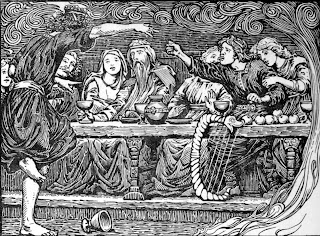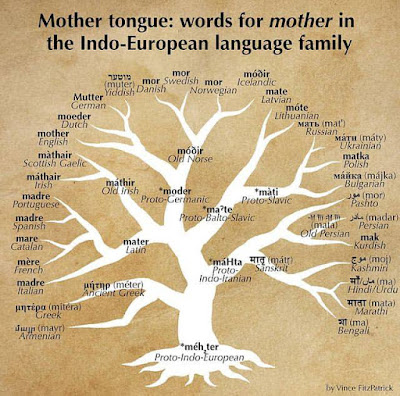Fair Speech, Deeds, and Kinship in Modern Heathen Practice
I have been thinking a lot about Fair Speech in heathenry for a long time. I first became aware of the concept of Fair Speech when I was studying Beowulf in university. Fair Speech is very much tied to other heathen concepts such as Deeds, and Kinship. All three of these concepts relate to Frith and Grith in a way that is so interwoven that it is impossible to separate them. As such, I will focus on Fair Speech in this post, and bring in the other two as they relate to it when talking about Frith and Grith. My hope is that this approach will create a more complete picture of heathenry and these concepts.
Fair Speech in its essence boils down to civility and courtesy, the ability to express oneself without being disruptive to the social order or causing unnecessary offense. Within the tribe this takes the form of having a difference of opinion with one’s Kin, but expressing it in dialogue in such a way that all parties can engage in an open discussion that will neither alienate tribe members, nor create permanent rifts. Fair Speech occurs when all involved parties speak carefully, and intelligently to make themselves understood, while also listening actively to the opposing view, and understanding both humility and compromise and when to use them to maintain the group Frith. Ideally, a discussion of differences within the tribe is meant to draw the party who is farthest from the shared values of the tribe back into the group Frith and reinforce the bonds of Kinship.
Kin determine how much of an opposing view the individual can carry without being disruptive to the functioning of the tribe as a whole. As such, compromises must be reached to maintain group Frith and ensure the wellbeing of all. If an individual is unwilling to be compromising and self-reflective they risk alienation from the tribe. This said, if someone new enters a tribe it does cause a shift in the thinking of the tribe as a whole, and that individual helps to reinforce the values of the tribe in new ways, and reform values to fit the tribe in its new form. The tribe moves in to meet the individual, as long as the individual is also willing to move in, accept responsibility when they misstep, and learn how to fit within the established order of the tribe.
Kinship is the sense of responsibility to a group of people, to be involved in their lives, to do what is best for the group, and to build and maintain Frith. These are the people closest to you by blood or by oath. They are the people who have your best interests in mind, and who you share bonds of reciprocity with. You have a stake in their wellbeing, because that wellbeing is shared. Both the way you interact with kin, and the way you present yourself in the broader community, affect the luck of the tribe.
Another element of Fair Speech is the connection between what is said and what is done. There is an expectation that the individual will speak carefully when oathing to ensure that they can follow through with that oath and maintain the luck of the tribe. An individual’s worth to the tribe hinges on their ability to turn speech into action, proving their trustworthiness, and establishing Frith.
In terms of how Fair Speech relates to Grith, it is also necessary to maintain poise and careful speech when interacting with those outside the tribe. This prevents causing insult, that would come back to hurt the tribe. The individual living within a tribal structure must be always aware of how their behaviours when dealing with outside persons and groups will affect the well-being of the group in the moment and down the road. It is most important that the tribe and its members establish Grith with other heathens, but it is also important to use Fair Speech with other strangers outside of heathenry to maintain a good image for the tribe that will prevent harm to it by these outside parties. This is especially true in the modern landscape where tribal communities are not the norm, and easily misunderstood by outside parties. In Pre-Christian Scandinavia the focus of Fair Speech in establishing Grith would have been to prevent feuds between tribes. However, in the modern context, Fair Speech more commonly is going to be used in associating with individuals and groups who do not have an understanding of tribal dynamics or Grith, leading to a much more challenging dynamic.
A member of a tribe still needs to maintain Fair Speech where possible, to avoid causing lasting offense, while being unsure if the other party will act reciprocally. Even with strangers it is best to use caution, as this person may interact again with the tribe later and have formed opinions based on previous interactions. This does not mean that the individual should continue to act eloquently when dealing with a party that has made it clear they have no willingness to reciprocate. The individual must carefully weigh their Deeds to determine the least harmful interaction as best they can. If the opposing party is already acting with hostility, then there is a possibility that they cannot be reasoned with, and should be avoided or treated as hostile.
The importance of Deeds within heathenry is to prove your worth to the tribe. Your actions show your character and when you follow through with what you say you will do it increases the luck of the tribe. By acting for the good of the tribe and acting honourably your Deeds gain worth. It is important to realize that not only your actions are deeds, but your words can be as well, which is why this concept can be so interconnected with Fair Speech. Your Deeds show that you are reliable and trustworthy, and the value you place on your Kinship bonds. Deeds are connected to Frith because individuals act for the well-being of the community, and to do so they must think before acting or speaking so as not to cause harm to their Kin. Since speech acts are Deeds, that makes Fair Speech itself a Deed.
As you can see these concepts are connected like strands in a spiderweb. You cannot have one without the other or the whole structure would crumble. Beowulf is a great source to help you understand the power of Fair Speech, but of course we also see the opposite if we look at Loki’s taunts in the Lokasenna, and how that drives Loki away from the Æsir. There are many more examples of Fair Speech throughout the Lore if you look closely. I will try to cite my sources for this blog below, but that is assuming I remember all of them. If you stuck through this one to the end I commend you, and hope you found it valuable.
Sources:
Beowulf translated by Lesslie Hall https://www.gutenberg.org/files/16328/16328-h/16328-h.htm
The Culture of the Teutons by Vilhelm Gronbech
Lokasenna https://www.sacred-texts.com/neu/poe/poe10.htm
"Never in Public: Women and Performance in Old Norse Literature" by Zoe Borovsky
"The Performative Man: Nið and Gender in a Skald Saga" by Veronika Egyed
"Sewn Lips, Propped Jaws, and a Silent Áss (or Two): Doing Things with Mouths in Norse Myth" by Kevin J. Wanner
"Speech Acts and Violence in the Sagas" by Frederic Amory
"Speech as Gift in Beowulf" by Robert E. Bjork
"Waging word wars: a discourse analysis of the patterns of Norse masculinity presented through mannjafnaor in the Icelandic sagas" by Jonathan Mark Broussard
We Are Our Deeds: The Elder Heathenry, Its Ethic and Thew by Eric Wodening
Women in Old Norse Literature: Bodies, Words, and Power by Jóhanna Katrín Friðriksdóttir
"Words Speak Louder Than Actions: The Power of Vocality and Oral Communication in Medieval Viking Literature" by Yasmine Abdel-Jawad
Image Source:
“Loki Taunts Bragi” (1908) by W. G. Collingwood



